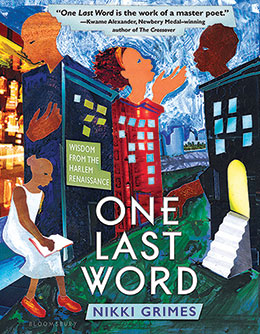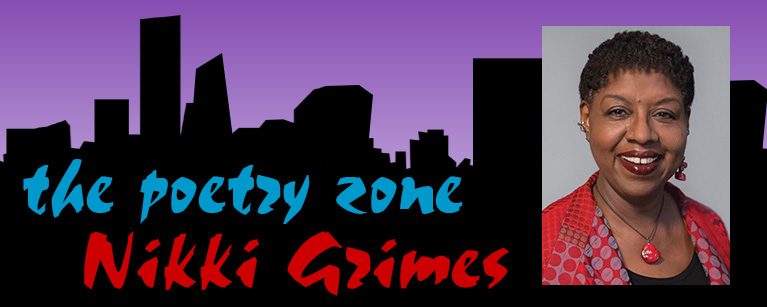
written by Nikki Grimes
illustrated by a number of very talented artists: Cozbi Cabrera, R. Gregory Christie, Pat Cummings, Jan Spivey Gilchrist, Ebony Glenn, Nikki Grimes, E.B. Lewis, Frank Morrison, Christopher Myers, Brian Pinkney, Sean Qualls, James Ransome, Javaka Steptoe, Shadra Strickland, and Elizabeth Zunon
Bloomsbury, January 2017
Buy the book
buy the hardcover
paperback
buy the e‑book
One Last Word
Wisdom from the Harlem Renaissance
In this collection of poetry, Nikki Grimes looks afresh at the poets of the Harlem Renaissance — including voices like Langston Hughes, Georgia Douglas Johnson, and many more writers of importance and resonance from this era — by combining their work with her own original poetry. Using “The Golden Shovel” poetic method, Grimes has written a collection of poetry that is as gorgeous as it is thought-provoking.
A foreword, an introduction to the history of the Harlem Renaissance, author’s note, poet biographies, and index makes this not only a book to cherish, but a wonderful resource and reference as well.
Awards and Recognition
- Arnold Adoff Poetry Award for Middle Readers, 2018
- Boston Globe-Horn Book Honor Book, 2017
- Chicago Public Library’s Best Informational Books for Older Readers, 2017
- Claudia Lewis Award, Bank Street College, 2018
- International Youth Library’s White Raven List featured at the Bologna Children’s Book Fair 2019
- Kirkus Reviews Best Middle Grade Poetry, 2017
- Lee Bennett Hopkins Poetry Award, 2018
- The Lion and the Unicorn Award for Excellence in North American Poetry
- Massachusetts Children’s Book Award List 2018–2019
- Myra Cohn Livingston Award for Poetry from the Children’s Literature Council of Southern California
- NCTE Notable Poetry List, 2018
- Reading Beyond 2020, ALSC and The Children’s Book Council
- School Library Journal Best Books of 2017, nonfiction
- YALSA Quick Picks for Reluctant Readers
Resources
- Teacher’s Guide
- School Library Journal, “A Renaissance Woman,” Luann Toth, Feb 3, 2017
Nikki reads “Jabari Unmasked” from One Last Word, one of her favorite books. All the poems in One Last Word are Golden Shovel poems. Several of the lines are borrowed from “We Wear The Mask” by Paul Laurence Dunbar, one of her favorite poets from the Harlem Renaissance.
Nikki reads poems “Truth,” “A Safe Place,” and “The Sculptor” from One Last Word, one of her favorite books. All the poems in One Last Word are Golden Shovel poems where several of the lines are borrowed from her favorite poets from the Harlem Renaissance. Cover illustration by Christopher Myers. Thank you Bloomsbury for allowing me to share this book!
Reviews
Timely and thought-provoking, Grimes’ collection transports young readers through the enduring expressiveness of the Harlem Renaissance, juxtaposing classic poems of the era with her own original work and full-color art by contemporary African-American illustrators. Grimes’ choice of form, the Golden Shovel poem, does the magic of weaving generations of black verbal artistry into a useful, thematic, golden thread. A challenge indeed, the structure demands taking either a short poem in its entirety or a line from that poem, known as a “striking line,” in order to serve as the foundation for a new poem in which each line ends with one word from the original. With this, the classic opening line of Jean Toomer’s “Storm Ending” (“Thunder blossoms gorgeously above our heads”) is reinvigorated within new verse as Grimes reminds young readers that “The truth is, every day we rise is like thunder— / a clap of surprise. Could be echoes of trouble, or blossoms / of blessing.” Grimes joins the work of historic black wordsmiths such as Georgia Douglas Johnson, Countee Cullen, Langston Hughes, plus the less-anthologized yet incredibly insightful Gwendolyn Bennett and Clara Ann Thompson, with her contemporary characters and thematic entanglements to bring forth a Harlem Renaissance that is as close to the present as the weight of injustice and unfulfilled promise that they spoke through. This striking, passionate anthology reminds young readers and adult fans of poetry alike that while black life remains “no crystal stair,” there remains reason to hope and a reserve of courage from which to draw. (Kirkus Reviews, starred review)
Between the covers of this compact volume lies artistic, literary, sociocultural, and curricular gold. Taking her inspiration from the poets of the Harlem Renaissance and her poetic form from a method first developed to honor Gwendolyn Brooks, Grimes offers an introduction and a homage to these strong African-American voices. After providing brief author’s notes on the Harlem Renaissance and its role in inspiring her own work, she describes and demonstrates the Golden Shovel form, wherein a poet takes the words from a line or several lines of an existing poem, places them vertically against the right margin, and crafts a new poem around them. Working with powerful yet child-friendly poems by the luminaries of the period as well as lesser-known poets such as Gwendolyn Bennett and Clara Ann Thompson, Grimes then organizes her new poems, alongside the originals, into thematic strands that remain hauntingly relevant to contemporary experience. Her riffs not only honor but also interpret the poems she has chosen, building stories and drawing thematic and intergenerational connections through the creation of narrative voices of different ages. Mothers and elders exhort and reflect while young boys and girls plead and dream, reimagining the sorrows and dreams of the legendary wordsmiths into scenarios involving superheroes, bullies, peer pressure, poverty, and prom dates that young readers will relate to. This is simply essential for both personal and classroom collections. (Bulletin for the Center of Children’s Books, starred review)
In this innovative and powerful compendium, Grimes pairs original poems with classics from the Harlem Renaissance. In a brief historical note on the period, she acknowledges the significance of black artists giving voice to the experiences of black life and cites the continued relevance of the literature of the period in a society that, decades later, still struggles with racial identity and injustice. The author credits as inspiration the messages of hope, perseverance, survival, and positivity she finds in the work of poets like Countee Cullen, Georgia Douglas Johnson, and Langston Hughes, and she, too, explores these themes in her own poems. Furthermore, Grimes brilliantly uses the words of her literary predecessors to structure the book, employing the golden shovel, a form in which the words from selected lines or stanzas are borrowed, only to become the last words of each line in a new poem. The result is not only a beautiful new homage to the Harlem Renaissance but also a moving reflection on the African American experience and the resilience of the human spirit: “The past is a ladder/that can help you/keep climbing.” In addition, each pair of poems—each of Grimes’s works follows the poem that inspired it—is accompanied by a full-color illustration by a prominent African American illustration. Featured artists include Pat Cummings, E.B. Lewis, Christopher Myers, Brian Pinkney, and Javaka Steptoe, among others, and the back matter contains brief poet and illustrator biographies. VERDICT This unique and extraordinary volume is a first purchase for all middle school poetry collections. (School Library Journal, starred review)
“Can I really find/fuel for the future/in the past?” asks Grimes (Words with Wings) in the opening poem of this slim, rich volume. Her answer is a graceful and resounding yes. Using the Golden Shovel poetic form, which borrows words from another poem and uses them at the end of each line in a new piece, Grimes both includes and responds to works from poets of the Harlem Renaissance, including Gwendolyn Bennett, Countee Cullen, and Langston Hughes. Thus, a line from Georgia Douglas Johnson’s “Calling Dreams” (“The right to make my dreams come true”) provides “anchor words” (highlighted in bold) for Grimes’s “The Sculptor,” which emphasizes seizing what one desires (“Dreams do not come./They are carved, muscled into something solid, something true”). Through a chorus of contemporary voices—including proud parents, striving children, and weary but determined elders—Grimes powerfully transposes the original poems’ themes of racial bias, hidden inner selves, beauty, and pride into the here and now. Interspersed artwork from African-American artists, including R. Gregory Christie, Brian Pinkney, and Elizabeth Zunon, and brief biographies of each poet flesh out a remarkable dialogue between past and present. (Publishers Weekly, starred review)
In this collection, Grimes transforms poems from the Harlem Renaissance into creations of her own using the golden shovel method. Each of Grimes’s poems is accompanied by the referent poem and illustrations from one of several acclaimed artists. In addition to the inspiration for the collection and a definition of golden shovel poetry, Grimes includes biographies of the poets whose work she reflects. As a whole, the collection acknowledges that while life for African Americans is ‘no crystal stair,’ it is one yet full of hope.” (NCTE 2018 Notable Poetry committee)


